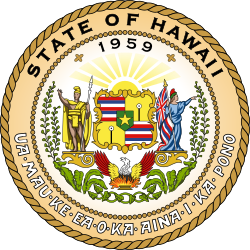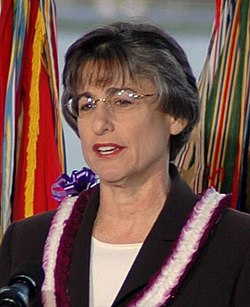| ||||||||||||||||||||
| ||||||||||||||||||||
 County results Lingle: 50–60% Hirono: 50–60% | ||||||||||||||||||||
| ||||||||||||||||||||
| Elections in Hawaii |
|---|
 |
The 2002 Hawaii gubernatorial election was held on November 5, 2002, to select the governor of Hawaii. Incumbent Democratic Governor of Hawaii Ben Cayetano was term-limited and therefore could not run for re-election. Former Maui Mayor Linda Lingle, who had narrowly lost the 1998 election, was nominated once again by the Republicans while Lieutenant Governor Mazie Hirono earned the Democratic nomination in a tight race. Lingle and Hirono duked it out in a hard-fought campaign, with Hirono's campaign crippled by allegations of corruption within the Hawaii Democratic Party and many voters desiring a change. [1] The influence of migrants from the mainland as well as the decrease in party loyalty of ethnic groups led more voters towards Lingle. [2] Ultimately Lingle defeated Hirono in a close election, making her the first Republican governor of Hawaii elected since 1959 and the state's first-ever female governor. She was the first white person to be elected governor of the state since 1970. Lingle and Hirono faced off again in Hawaii's 2012 U.S. Senate election; Hirono won that race and thus became the first female U.S. senator in Hawaii history.

